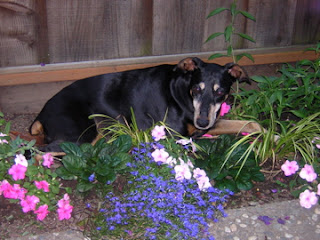Barking is a natural behavior for dogs, and some dogs bark more than others. Some bark at certain things, some bark at everything. Sometimes it is an alert bark, sometimes a happy bark, or sometimes a protective bark. But for a service dog, barking is almost always a no-no. Nobody wants to be seated in a restaurant at a table next to a dog that barks because they heard a noise or someone that looks weird to them walks by. Or be in a hotel room next to another room that has a dog staying in it that barks at every bump or noise. One of the worst is walking with your own dog and having someone else walk by with a crazy reactive dog that goes nuts when it sees your dog. Unfortunately, I seem to be the poor person walking by with the crazy dog-reactive dog.
Patrick barking at other dogs has been an issue since we got him as a baby puppy. He is great with dogs he knows but very reactive when he sees dogs he doesn’t know. Around 14-16 weeks of age he was making pretty good progress and doing better and we were very excited by his progress. And then while on a hike (on a trail where dogs are supposed to be leashed) an off-leash Golden came running up to Patrick, Ricki, and me. It stood in front of us and stared. Well, Patrick really didn’t like that and went into a huge barking fit that went on even after the owner of the dog came and took it away from us. That one moment set Patrick’s progress back—all the hard work and training seemed to just disappear. After that day, Patrick was very reactive with almost every dog he saw on a walk or out in public. We had to start our training all over again.
How can you fix this issue? Every dog is different and will respond to training differently. This is our first time working a puppy through this specific issue. I have raised puppies in the past that were very fearful of different situations and the best thing for them was to take a break for a few weeks and not expose them to what was bothering them. Patrick, on the other hand, does better the more stimuli you give him. As an experiment I decided to take him to a pet expo a few months ago where we knew lots of dogs would be there. He barked a little bit with excitement when I got him out of the car, but then no more while we were there. Although I had a hard time keeping him from pulling at times while walking, to my surprise he was quiet despite being around over 100 strange dogs. Now this hasn’t fixed the problem but it was definitely a step in the right direction.
Since then I have been working Patrick to walk quietly around dog parks—not in them, just around them. There are multiple dog parks close to where we live, so it is easy to work him at many different locations. My goal is to be able to walk Patrick up to the fence and have him watch the other dogs inside running and playing, all while being able to remain calm and quiet. We aren’t there yet but making baby steps.
We are also making trips to pet store, where the goal is to be able to walk calmly and quietly through the store even if he sees another dog. Once again, he isn’t perfect at this yet, but making progress. For me, it is a lot less embarrassing to be in a store that allows dogs if Patrick lets out a bark or two, than in a store where we may run into a pet dressed as a service dog and he lets out a couple of barks (and yes, this has happened).
Patrick can smell if there is a dog close by him and his body language does change. One time, we were shopping in Target and I noticed his body language change. Sure enough, someone was passing by with a small dog in the shopping cart. I got lucky that Patrick didn’t see it in the cart and we were able to continue without any outbursts.
We are also now attending dog training classes to get Patrick around other dogs in a controlled setting. I purposely put him in a class called “dogs with attitudes” so that he would at times be “set up” to be around other dogs that bark at things, because he will often bark if another dog by him barks first. After attending two classes I already see some improvement. I did have to laugh a little bit when I first joined that out of the seven dogs in attendance five of them were German Shepherds.
I will admit that I do get a little anxiety when working Patrick in public. I never know when we will come across another dog. While Patrick is doing much better when multiple dogs are around him, it seems to be the surprise appearance of a single dog that sets him off the most. His barking is embarrassing at times.One time we were walking in a mall and he saw another dog across they way and barked. He completely frightened the people walking in front of us, who had no idea that Patrick was behind them. Not to mention that a 65-pound Shepherd barking can be a little scary to some people.
Another time we were having lunch with a friend and were seated outside on the sidewalk because Ricki and Ozzy were there as well. Along came a person walking down the sidewalk with their dog. That dog barked at us and then everyone was barking. That was probably our most embarrassing moment.
Patrick’s barking issue isn’t going to away overnight. Issues like this take a lot of time, work, guidance, and patience to get through. Despite this issue being frustrating and embarrassing at times, I still have high hopes for Patrick. He has been making progress in the right direction and he is so solid on almost every other aspect a working service dog needs. He settles nicely, has great relieving habits, is very confident, super smart, loves to learn new things, and most of all seems to love to work. I hope that by sharing some of my struggles with Patrick’s training I can help other people who are raising not feel so alone with their struggles. Puppy raising is a journey with good days and, well, let’s just say not so good days. I have learned with past puppies not to give up when things are hard—sometimes they will really surprise you. Some puppies take a little longer to mature and learn, so give them a chance to grow and learn at their pace.
Amie













